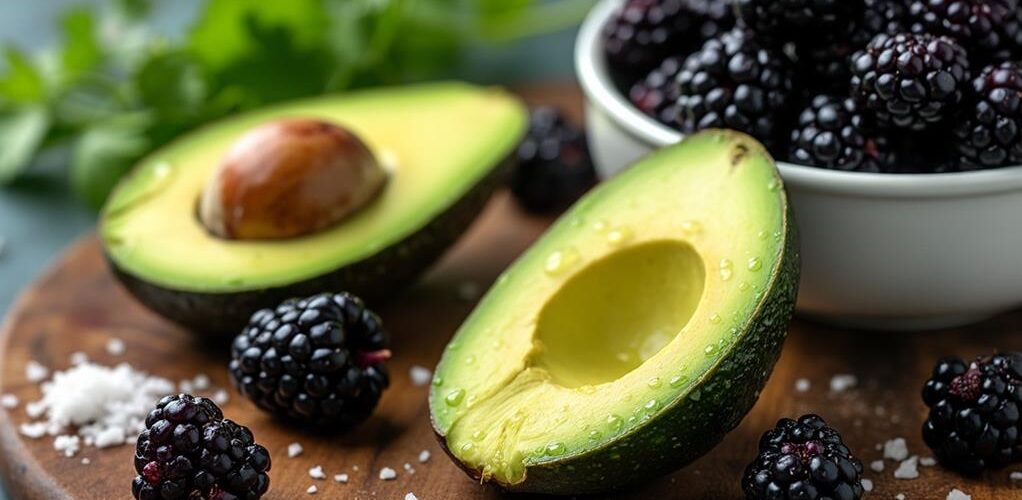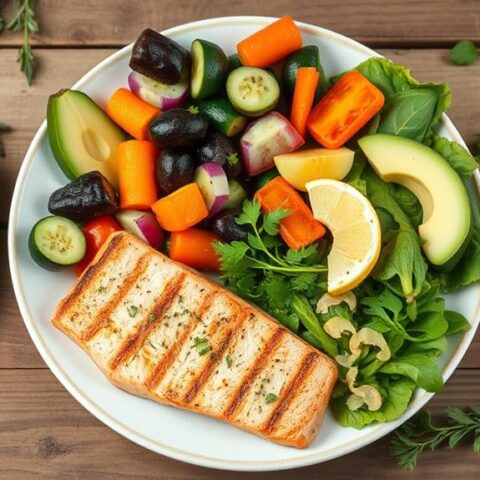
For those on a keto diet, avocados are an exceptional choice due to their low net carbs and high healthy fat content. Watermelon, while slightly higher in carbs, can be enjoyed in moderation and is rich in vitamins and antioxidants like lycopene. Strawberries provide a modest amount of net carbs and are packed with vitamin C and hydration benefits. Raspberries boast even lower carbs and are an excellent source of antioxidants and vitamin C. Finally, lemons offer minimal net carbs and are high in immune-supporting vitamin C. Delving further can help you discover more about balancing these fruits in your diet.
Key Takeaways
- Avocados are low in net carbs and rich in healthy fats, making them ideal for keto diets.
- Raspberries contain only 5 grams of net carbs per cup and are packed with antioxidants.
- Strawberries have about 8.7 grams of net carbs per cup and a low glycemic index.
- Lemons offer about 4.5 grams of net carbs per fruit and are high in vitamin C.
- Watermelon, when eaten in moderation, provides essential vitamins and only 11 grams of net carbs per cup.
Avocados
Avocados
Although often mistaken for a vegetable, avocados are botanically classified as a fruit and are particularly well-suited for a ketogenic diet due to their low net carbohydrate content. With approximately 8.5 grams of total carbohydrates and nearly 7 grams of fiber per 100-gram serving, the net carb count is around 1.5 grams. This low carbohydrate profile makes avocados an excellent choice for maintaining ketosis.
Avocados are also rich in healthy monounsaturated fats, with one avocado containing about 15 grams of fat, which is beneficial for heart health and supports the ketogenic lifestyle. Additionally, avocados are a good source of essential vitamins such as vitamin E, K, and B6, as well as minerals like potassium, which is vital for regulating blood pressure.
Furthermore, avocados offer approximately 240 calories per fruit, making them a satiating option for those on a ketogenic diet. Their high fiber content, roughly 10 grams per serving, supports digestive health and helps maintain feelings of fullness.
Avocado recipes such as guacamole, avocado salads, and smoothies can seamlessly integrate this nutrient-rich fruit into a keto-friendly meal plan.
Watermelon
While avocados offer a wealth of benefits for those on a ketogenic diet, another fruit to contemplate is watermelon. A 1-cup (152-gram) serving of watermelon contains approximately 11.5 grams of total carbohydrates and 0.5 grams of fiber, resulting in about 11 grams of net carbs. This relatively high carb content necessitates careful portion control to stay within daily keto carb limits.
Despite the need for moderation, watermelon offers several health benefits that make it a valuable addition to a ketogenic diet. It is rich in vitamin C, potassium, and copper, which are essential for supporting immune function and overall health. Moreover, watermelon is an excellent source of lycopene, an antioxidant associated with reduced cell damage and potential benefits for heart and skin health. Curiously, healthy fats from other keto-friendly foods can complement the nutrients found in watermelon.
For ideal freshness, it is recommended to store cut watermelon in an airtight container in the refrigerator. This practice helps preserve its nutrient content and hydrating qualities.
While watermelon's carb content requires mindful consumption, its array of vitamins and antioxidants can contribute positively to a balanced keto diet when enjoyed in appropriate portions.
Strawberries
Strawberries present a compelling option for those adhering to a ketogenic diet, offering approximately 8.7 grams of net carbs per 1-cup (152-gram) serving.
These vibrant berries not only fit within the carbohydrate limits of a keto regimen but also offer a wealth of health benefits. Rich in antioxidants, strawberries are an excellent source of vitamin C, manganese, and folate, which are essential for supporting immune function and overall health.
Additionally, their low glycemic index helps stabilize blood sugar levels, making them a valuable addition to a low-carb lifestyle. Strawberries also have hydrating properties due to their high water content, approximately 91%, which is a vital factor for anyone following a low-carb eating plan.
This hydrating quality, combined with their nutrient density, makes strawberries an ideal snack or ingredient in various keto-friendly recipes.
Key health benefits and recipe ideas include:
- Antioxidant-rich: Supports immune function and reduces oxidative stress.
- Low glycemic index: Helps maintain stable blood sugar levels.
- Hydrating properties: Contributes to overall hydration.
- Versatile ingredient: Enhances keto-friendly salads and desserts.
Incorporating strawberries in moderation can add both flavor and nutritional value to your ketogenic diet without greatly impacting daily carb limits.
Raspberries
Building on the nutritional benefits offered by strawberries, raspberries provide another excellent fruit choice for individuals adhering to a ketogenic diet. Raspberries contain approximately 7 grams of total carbohydrates and 8 grams of dietary fiber per 1-cup (123-gram) serving, which translates to about 5 grams of net carbs, making them a keto-friendly fruit option.
Rich in antioxidants, particularly ellagic acid, raspberries may help reduce inflammation and support overall health. They are also an excellent source of vitamin C, supplying around 54% of the daily recommended intake per cup. This nutrient is crucial for immune function and skin health.
Additionally, raspberries are a good source of manganese, contributing about 41% of the daily value per serving, which is essential for bone health and metabolic processes. Adding raspberries to your diet can also aid in enhanced appetite control and provide steady energy levels due to their low carbohydrate content.
When consumed in moderation, raspberries can be incorporated into various keto recipes. They can enhance the flavor of smoothies, salads, and desserts, while keeping carbohydrate intake low.
The versatility and numerous raspberry benefits make them an ideal choice for those seeking to add nutrient-dense, low-carb fruits to their ketogenic meal plan.
Lemons
Lemons are an excellent addition to a ketogenic diet, offering a low-carb profile with approximately 4.5 grams of net carbs per medium-sized fruit. Rich in vitamin C, a single lemon provides about 53 mg, supporting immune function and skin health.
The high pectin content found in lemons can help stabilize blood sugar levels and reduce inflammation, making them a beneficial choice for those on a keto regimen. Moreover, lemons contribute to better skin health and can help to reduce visceral fat, which is linked to serious health issues.
Incorporating lemon juice into your meals not only enhances flavor but also maintains a low-carb profile, with roughly 3 grams of carbohydrates per juice from one lemon. Additionally, lemons contain antioxidants that contribute to overall health, aiding in the reduction of cell damage and lowering the risk of chronic diseases.
Benefits of Lemons on a Keto Diet
- Low-Carb Content: Approximately 4.5 grams of net carbs per medium-sized lemon.
- High in Vitamin C: Supports immune function and skin health with 53 mg of vitamin C.
- Blood Sugar Stabilization: High pectin content helps stabilize blood sugar levels.
- Antioxidant Properties: Reduces cell damage and lowers the risk of chronic diseases.
Including lemons in your keto-friendly recipes can provide numerous nutritional advantages while keeping your carbohydrate intake in check. Exploring lemon benefits and lemon recipes can additionally enhance your ketogenic dietary experience.
Frequently Asked Questions
What Fruit Can I Eat on a Keto Diet?
On a keto diet, you can enjoy low-carb fruits such as avocados, raspberries, strawberries, lemons, and tomatoes. These fruits are ideal for keto fruit smoothies and low carb snacks, offering essential nutrients like vitamins, antioxidants, and healthy fats.
What Fruits Are Not Keto-Friendly?
High sugar fruits such as bananas, grapes, apples, oranges, and pineapples are not keto-friendly due to their increased carbohydrate content. For low carb options, individuals should seek alternatives that align with the ketogenic diet's carbohydrate restrictions.
Can I Eat Fruit on Keto and Still Lose Weight?
Yes, consuming keto-friendly fruits can support weight loss when adhering to proper fruit portion control. Keto fruit benefits include essential nutrients and antioxidants, provided total carb intake is monitored to maintain ketosis effectively.
What Is the Most Carb Friendly Fruit?
Raspberries are the most carb-friendly fruit, containing only 2.6 grams of net carbs per 19 berries. This makes them ideal low-carb berries and keto-friendly snacks, offering essential nutrients while adhering to a ketogenic dietary regimen.
Conclusion
To sum up, avocados, watermelon, strawberries, raspberries, and lemons represent keto-friendly fruit options that align with the dietary restrictions of a ketogenic regimen. Each of these fruits provides essential nutrients while maintaining low carbohydrate content, thereby supporting the metabolic state of ketosis. Incorporating these fruits into a ketogenic diet can enhance nutritional intake without compromising carbohydrate limits, thereby contributing to overall health and adherence to dietary goals. These selections offer both variety and essential vitamins and minerals.










No Comments